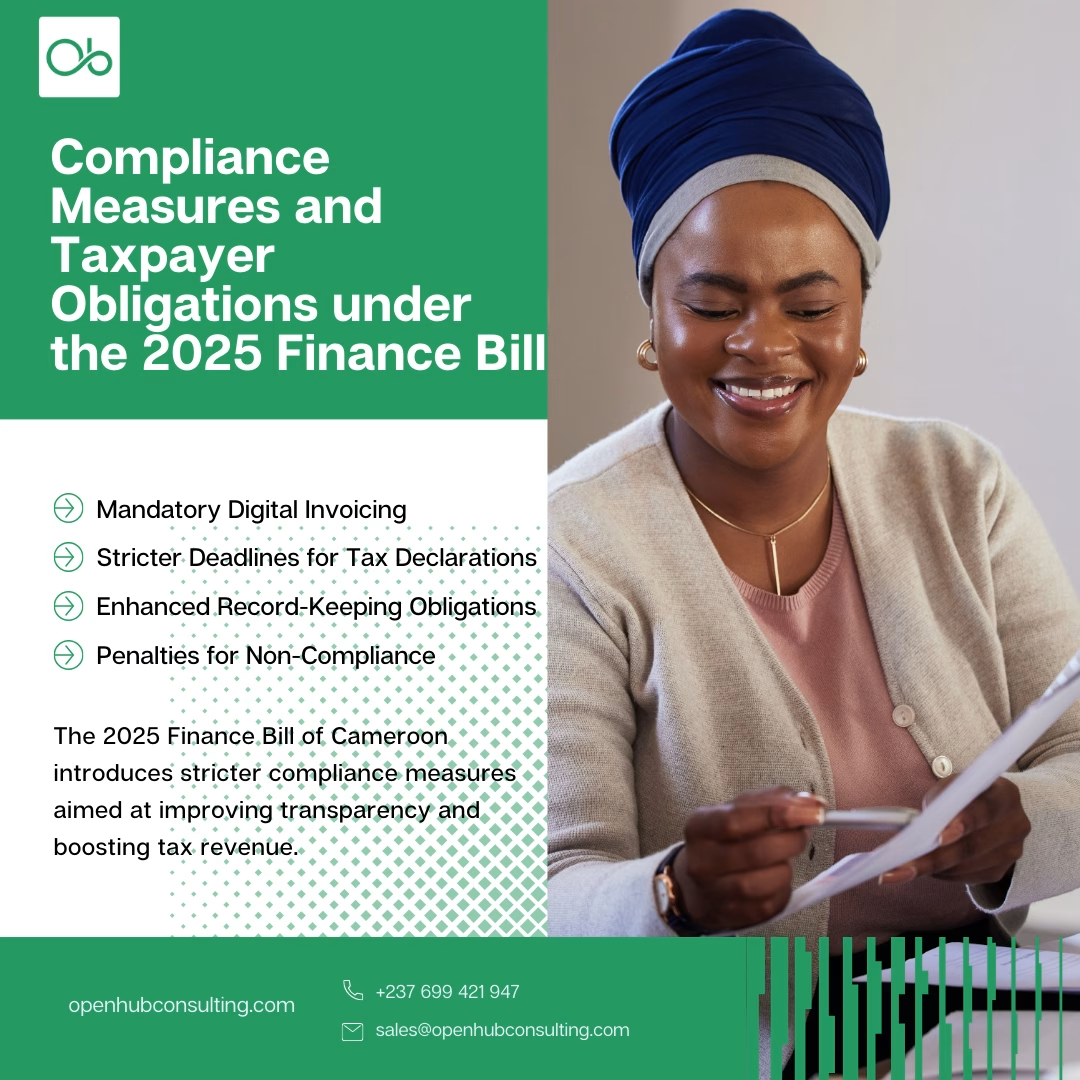The 2025 Finance Bill of Cameroon introduces stricter compliance measures aimed at improving transparency and boosting tax revenue. These measures place new obligations on taxpayers, particularly Small and Medium-sized Enterprises (SMEs). While the reforms aim to modernize the fiscal system, they also bring challenges that SMEs must navigate carefully.
Key Compliance Measures
- Digital Invoicing:
- The bill requires businesses to adopt electronic invoicing systems. This measure is designed to curb tax evasion and improve tracking of transactions.
- Example: A small retail shop must now issue electronic receipts for every sale, replacing handwritten invoices.
- Streamline Your Process: Consider using Kola Business Manager, a powerful Point of Sale (POS) system that simplifies invoicing and helps businesses stay compliant.
- Important Note on Invoices: Section 8a of the 2024 General Tax Code emphasizes the non-deductibility of expenses when:
- They are supported by invoices that don’t have the mandatory information as outlined in Article 150(3) of the General Tax Code (this applies to domestic invoices only, not those from foreign suppliers).
- They are justified by invoices issued outside the tax authority’s electronic invoicing monitoring system. This suggests a strong push towards electronic invoicing and makes it very advantageous for businesses to use the system. However, it doesn’t explicitly prohibit other forms of invoicing. Other invoice types are allowed as long as they include the mandatory information and are reported within the system.
- Stricter Deadlines for Tax Declarations:
- Taxpayers are required to submit declarations within tighter timelines. Late submissions will attract higher penalties.
- Example: SMEs must now file annual tax returns by the new deadlines (e.g., March 15 for large businesses, April 15 for medium-sized businesses).
- Get Professional Help: Our Tax Management Services ensure your tax declarations are accurate and submitted on time, helping you avoid penalties.
- Enhanced Record-Keeping Obligations:
- Businesses must maintain detailed accounting records, including inventory movement and employee information, in compliance with the OHADA accounting system.
- Example: A manufacturing SME must document all stock purchases and sales electronically to meet compliance standards.
- Stay Organized: Our Bookkeeping Services can help you keep accurate and up-to-date records, reducing stress and improving compliance.
- Penalties for Non-Compliance:
- The bill introduces higher fines for violations such as late declarations, failure to use digital invoices, or incomplete record-keeping.
- Example: A restaurant failing to issue electronic receipts could face penalties exceeding 100,000 CFA per transaction.
- Simplify Accounting: With our Accounting Services, you can ensure your financial records are in order and avoid costly mistakes.
Opportunities for SMEs
Despite the challenges, these compliance measures offer opportunities:
- Improved Financial Management: Digital invoicing and detailed record-keeping can help SMEs streamline operations and gain better insights into their financial health.
- Access to Incentives: Compliance ensures eligibility for tax reliefs and government-backed programs, such as green energy incentives.
- Building Credibility: Businesses that comply with regulations are more likely to attract investors and secure contracts with larger companies.
How SMEs Can Adapt
- Invest in Digital Tools:
- Adopt affordable accounting and invoicing software to meet digital compliance requirements. For example, apps like Wave or QuickBooks can simplify the process for small businesses.
- For a localized solution, Kola Business Manager offers a complete POS and invoicing system tailored to Cameroonian businesses.
- Train Staff:
- Ensure employees understand the new obligations, from issuing digital receipts to maintaining proper records.
- Engage Professionals:
- Hire tax consultants or accountants to help navigate the changes and avoid costly mistakes.
- Our Tax Management Services and Accounting Services are designed to provide expert guidance tailored to your business needs.
- Plan Ahead:
- Set reminders for key tax deadlines to avoid late submissions and penalties.
Conclusion
The compliance measures under the 2025 Finance Bill are a step towards modernizing Cameroon’s fiscal system. For SMEs, these changes demand careful adaptation but also promise long-term benefits. By embracing digital tools and adhering to regulations, businesses can not only avoid penalties but also position themselves for growth.
If this article helped you, you can support our work at OpenHub.
Support OpenHub DigitalYour Turn: What strategies are you using to comply with the 2025 Finance Bill? Share your thoughts in the comments or reach out for expert advice.
From Insight to Implementation
Going through the administrative and legal landscape in Cameroon requires more than just information—it requires a grounded local partner. At OpenHub Consulting, we specialize in helping the diaspora and international investors turn their business visions into compliant, operational realities.
If you are ready to move forward, our team is prepared to manage your registration and compliance from start to finish.
Start Your Company Incorporation →Discover more from OpenHub Digital
Subscribe to get the latest posts sent to your email.

